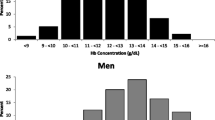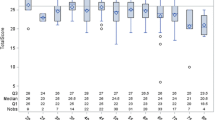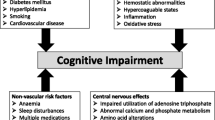Abstract
Purpose of Review
This review focuses on the relationships between diabetes, cognitive impairment, and the contribution of kidney disease.
Recent Findings
We review the independent contributions of parameters of kidney disease, including albuminuria, glomerular filtration, bone/mineral metabolism, and vitamin D synthesis, on cognitive performance in patients with diabetes. Potential pathophysiologic mechanisms underlying these associations are discussed highlighting gaps in existing knowledge. Finally, effects of the dialysis procedure on the brain and cognitive performance are considered. Emphasis is placed on novel non-invasive screening tools with the potential to preserve cerebral perfusion during hemodialysis and limit cognitive decline in patients with diabetic ESKD.
Summary
Patients with type 2 diabetes and advanced chronic kidney disease suffer a higher prevalence of cognitive impairment. This is particularly true in patients with diabetes and end-stage kidney disease (ESKD).
Similar content being viewed by others
References
Papers of particular interest, published recently, have been highlighted as: • Of importance •• Of major importance
Bailey RA, Wang Y, Zhu V, Rupnow MF. Chronic kidney disease in US adults with type 2 diabetes: an updated national estimate of prevalence based on kidney disease: improving global outcomes (KDIGO) staging. BMC Res Notes. 2014;2(7):415.
Afkarian M, Sachs MC, Kestenbaum B, Hirsch IB, Tuttle KR, Himmelfarb J, et al. Kidney disease and increased mortality risk in type 2 diabetes. J Am Soc Nephrol. 2013;24(2):302–8.
Hailpern SM, Melamed ML, Cohen HW, Hostetter TH. Moderate chronic kidney disease and cognitive function in adults 20 to 59 years of age: third National Health and nutrition examination survey (NHANES III). J Am Soc Nephrol. 2007;18(7):2205–13.
Farran CJ, Paun O, Cothran F, Etkin CD, Rajan KB, Eisenstein A, et al. Impact on an individual physical activity intervention on improving mental health outcomes in family caregivers of persons with dementia: a randomized controlled trial. AIMS Med Sci. 2016;3(1):15–31.
Mayeda ER, Haan MN, Neuhaus J, Yaffe K, Knopman DS, Sharrett AR, et al. Type 2 diabetes and cognitive decline over 14 years in middle-aged African Americans and whites: the ARIC brain MRI study. Neuroepidemiology. 2014;43(3–4):220–7.
Rawlings AM, Sharrett AR, Schneider AL, Coresh J, Albert M, Couper D, et al. Diabetes in midlife and cognitive change over 20 years: a cohort study. Ann Intern Med. 2014;161(11):785–93.
Dore GA, Waldstein SR, Evans MK, Zonderman AB. Associations between diabetes and cognitive function in socioeconomically diverse African American and white men and women. Psychosom Med. 2015;77(6):643–52.
Arvanitakis Z, Bennett DA, Wilson RS, Barnes LL. Diabetes and cognitive systems in older black and white persons. Alzheimer Dis Assoc Disord. 2010;24(1):37–42.
Hsu FC, Sink KM, Hugenschmidt CE, Williamson JD, Hughes TM, Palmer ND, et al. Cerebral structure and cognitive performance in African Americans and European Americans with type 2 diabetes. J Gerontol A Biol Sci Med Sci. 2018;73(3):407–14.
Parsa A, Kao WH, Xie D, Astor BC, Li M, Hsu CY, et al. APOL1 risk variants, race, and progression of chronic kidney disease. N Engl J Med. 2013;369(23):2183–96.
Gerber C, Cai X, Lee J, Craven T, Scialla J, Souma N, et al. Incidence and progression of chronic kidney disease in black and white individuals with type 2 diabetes. Clin J Am Soc Nephrol. 2018;13(6):884–92.
Weiner DE, Bartolomei K, Scott T, Price LL, Griffith JL, Rosenberg I, et al. Albuminuria, cognitive functioning, and white matter hyperintensities in homebound elders. Am J Kidney Dis. 2009;53(3):438–47.
Barzilay JI, Fitzpatrick AL, Luchsinger J, Yasar C, Bernick C, Jenny NS, et al. Albuminuria and dementia in the elderly: a community study. Am J Kidney Dis. 2008;52(2):216–26.
Barzilay JI, Gao P, O’Donnell M, Mann JF, Anderson C, Fagard R, et al. Albuminuria and decline in cognitive function: the ONTARGET/TRANSCEND studies. Arch Intern Med. 2011;171(2):142–50.
Murray AM, Barzilay JI, Lovato JF, Williamson JD, Miller ME, Marcovina S, et al. Biomarkers of renal function and cognitive impairment in patients with diabetes. Diabetes Care. 2011;34(8):1827–32.
Barzilay JI, Lovato JF, Murray AM, Williamson J, Ismail-Beigi F, Karl D, et al. Albuminuria and cognitive decline in people with diabetes and normal renal function. Clinc J Am Soc Nephrol. 2013;8(11):1907–14.
•• Kurella Tamura M, Tam K, Vittinghoff E, Raj D, Sozio SM, Rosas SE, et al. Inflammatory markers and risk for cognitive decline in chronic kidney disease: the CRIC Study. Kidney Int Rep. 2017;2(2):192–200 Higher levels of serum inflammatory markers (high-sensitivity C-reactive protein, fibrinogen, and interleukin 1β) are associated with increased risk of impaired executive function in patients with diabetes and kidney disease.
Kurella Tamura M, Vittinghoff E, Yang J, Go AS, Seliger SL, Kusek JW, et al. Anemia and risk for cognitive decline in chronic kidney disease. BMC Nephrol. 2016;17:13.
Sonoda M, Shoji T, Kuwamura Y, Okute Y, Naganuma T, Shima H, et al. Plasma homocysteine and cerebral small vessel disease as possible mediators between kidney and cognitive functions in patients with diabetes mellitus. Sci Rep. 2017;7(1):4382.
Bostom AG, Carpenter MA, Kusek JW, Levey AS, Hunsicker L, Pfeffer MA, et al. Homosysteine-lowering and cardiovascular disease outcomes in kidney transplant recipients. Circulation. 2011;123:1763–70.
Rapp SR, Luchsinger JA, Baker LD, Blackburn GL, Hazuda HP, Demos-McDermott KE, et al. Effect of a long-term intensive lifestyle intervention on cognitive function: action for health in diabetes study. J Am Geriatr Soc. 2017;65(5):966–72.
Sink KM, Divers J, Whitlow CT, Palmer ND, Smith SC, Xu J, et al. Cerebral structural changes in diabetic kidney disease: African American-diabetes heart study MIND. Diabetes Care. 2015;38(2):206–12.
Freedman BI, Divers J, Whitlow CT, Bowden DW, Palmer ND, Smith SC, et al. Subclinical atherosclerosis is inversely associated with gray matter volume in African Americans with type 2 diabetes. Diabetes Care. 2015;38(11):2158–65.
• Freedman BI, Gadegbeku CA, Bryan RN, Palmer ND, Hicks PJ, Ma L, et al. APOL1 renal-risk variants associate with reduced cerebral white matter lesion volume and increased gray matter volume. Kidney Int. 2016;90(2):440–9 Differential susceptibility to diabetic kidney disease could impact the effects of type 2 diabetes on the brain. Apolipoprotein L1 gene (APOL1) kidney risk variants were associated with reduced cerebral WML volume and increased GM volume.
Murea M, Hsu FC, Cox AJ, Hugenschmidt CE, Xu J, Adams JN, et al. Structural and functional assessment of the brain in European Americans with mild-to-moderate kidney disease: diabetes heart study – MIND. Nephrol Dial Transplant. 2015;30(8):1322–9.
•• Hughes TM, Sink KM, Williamson JD, Hugenschmidt CE, Wagner BC, Whitlow CT, et al. Relationships between cerebral structure and cognitive function in African Americans with type 2 diabetes. J Diabetes Complications. 2018;32(10):916–21 In African-Americans with type 2 diabetes, albuminuria and eGFR were significantly associated with cognitive performance even in patients with relatively preserved kidney function.
Huffman KM, Shah SH, Stevens RD, Bain JR, Muehlbauer M, Slentz CA, et al. Relationships between circulating metabolic intermediates and insulin action in overweight to obese, inactive men and women. Diabetes Care. 2009;32(9):1678–83.
Tai ES, Tan ML, Stevens RD, Low YL, Muehlbauer MJ, Goh DL, et al. Insulin resistance is associated with a metabolic profile of altered protein metabolism in Chinese and Asian-Indian men. Diabetologia. 2010;53(4):757–67.
Newgard CB, An J, Bain JR, Muehlbauer MJ, Stevens RD, Lien LF, et al. A branched-chain amino acid-related metabolic signature that differentiates obese and lean humans and contributes to insulin resistance. Cell Metab. 2009;9(4):311–26.
Wang TJ, Larson MG, Vasan RS, Cheng S, Rhee EP, McCabe E, et al. Metabolite profiles and the risk of developing diabetes. Nat Med. 2011;17(4):448–53.
Hernandez-Alvarez MI, Diaz-Ramos A, Berdasco M, Cobb J, Planet E, Cooper D, et al. Early-onset and classical forms of type 2 diabetes show impaired expression of genes involved in muscle branched-chain amino acids metabolism. Sci Rep. 2017;7(1):13850.
Chen DQ, Cao G, Chen H, Argyopoulos CP, Yu H, Su W, et al. Identification of serum metabolites associating with chronic kidney disease progression and anti-fibrotic effect of 5-methoxytryptophan. Nat Commun. 2019;10(1):1476.
Sharma K, Karl B, Mathew AV, Gangoiti JA, Wassel CL, Saito R, et al. Metabolomics reveals signature of mitochondrial dysfunction in diabetic kidney disease. J Am Soc Nephrol. 2013;24(11):1901–12.
Mapstone M, Cheema AK, Fiandaca MS, Zhong X, Mhyre TR, MacArthur LH, et al. Plasma phospholipids identify antecedent memory impairment in older adults. Nat Med. 2014;20(4):415–8.
Yu B, Zheng Y, Alexander D, Morrison AC, Coresh J, Boerwinkle E. Genetic determinants influencing human serum metabolome among African Americans. PLoS Genet. 2014;10(3):e1004212.
Bressler J, Yu B, Mosley TH, Knopman DS, Gottesman RF, Alonso A, et al. Metabolomics and cognition in African American adults in midlife: the atherosclerosis risk in communities study. Transl Psychiatry. 2017;7(7):e1173.
Miskulin DC, Meyer KB, Athienites NV, Martin AA, Terrin N, Marsh JV, et al. Comorbidity and other factors associated with modality selection in incident dialysis patients: the CHOICE study. Choices for healthy outcomes in caring for end-stage renal disease. Am J Kidney Dis. 2002;39(2):324–36.
Chen G, Cai L, Chen B, Liang J, Lin F, Li L, et al. Serum level of endogenous secretory receptor for advanced glycation end products and other factors in type 2 diabetic patients with mild cognitive impairment. Diabetes Care. 2011;34(12):2586–90.
Jassal SV, Chiu E, Li M. Geriatric hemodialysis rehabilitation care. Adv Chronic Kidney Dis. 2008;15(2):115–22.
Pereira AA, Weiner DE, Scott T, Sarnak MJ. Cognitive function in dialysis patients. Am J Kidney Dis. 2005;45(3):448–62.
O’Lone E, Connors M, Masson P, Wu S, Kelly PJ, Gillespie D, et al. Cognition in people with end-stage kidney disease treated with hemodialysis: a systematic review and meta-analysis. Am J Kidney Dis. 2016;67(6):925–35.
Kalirao P, Pederson S, Foley RN, Kolste A, Tupper D, Zaun D, et al. Cognitive impairment in peritoneal dialysis patients. Am J Kidney Dis. 57(4):612–20.
Seliger SL, Weiner DE. Cognitive impairment in dialysis patients: focus on the blood vessels? Am J Kidney Dis. 2013;61(2):187–90.
• Kurella M, Mapes DL, Port FK, Chertow GM. Correlates and outcomes of dementia among dialysis patients: the Dialysis Outcomes and Practice Patterns Study. Nephrol Dial Transplant. 2006;21(9):2543–8 Diabetes was independently associated with diagnosed dementia among patients with end-stage kidney disease. Diagnosed dementia was in turn associated with increased risk of death.
Liao JL, Xiong ZY, Yang ZK, Hao L, Liu GL, Ren YP, et al. An association of cognitive impairment with diabetes and retinopathy in end stage renal disease patients under peritoneal dialysis. PLoS One. 2017;12(8):e0183965.
Kurella Tamura M, Wadley V, Yaffe K, McClure LA, Howard G, Go R, et al. Kidney function and cognitive impairment in US adults: the reasons for geographic and racial differences in stroke (REGARDS) study. Am J Kidney Dis. 2008;52(2):227–34.
Salameh TS, Shah GN, Price TO, Hayden MR, Banks WA. Blood-brain barrier disruption and neurovascular unit dysfunction in diabetic mice: protection with the mitochondrial carbonic anhydrase inhibitor topiramate. J Pharmacol Exp Ther. 2016;359(3):452–9.
Mogi M, Horiuchi M. Neurovascular coupling in cognitive impairment associated with diabetes mellitus. Circ J. 2011;75(5):1042–8.
Bogush M, Heldt NA, Persidsky Y. Blood brain barrier injury in diabetes: unrecognized effects on brain and cognition. J NeuroImmune Pharmacol. 2017;12(4):593–601.
McIntyre CW, Goldsmith DJ. Ischemic brain injury in hemodialysis patients: which is more dangerous, hypertension or intradialytic hypotension? Kidney Int. 2015;87(6):1109–15.
Davenport A. What are the causes of the ill effects of chronic hemodialysis? Balancing risks: blood pressure targets, intradialytic hypotension, and ischemic brain injury. Semin Dial. 2014;27(1):13–5.
McIntyre CW. Recurrent circulatory stress: the dark side of dialysis. Semin Dial. 2010;23(5):449–51.
Eldehni MT, McIntyre CW. Are there neurological consequences of recurrent intradialytic hypotension? Semin Dial. 2012;25(3):253–6.
Kurella Tamura M, Vittinghoff E, Hsu CY, Tam K, Seliger SL, Sozio S, et al. Loss of executive function after dialysis initiation in adults with chronic kidney disease. Kidney Int. 2017;91(4):948–53.
Murray AM, Bell EJ, Tupper DE, Davey CS, Pederson SL, Amiot EM, et al. The brain in kidney disease (BRINK) cohort study: design and baseline cognitive function. Am J Kidney Dis. 2016;67(4):593–600.
• Findlay MD, Dawson J, Dickie DA, Forbes KP, McGlynn D, Quinn T, et al. Investigating the relationship between cerebral blood flow and cognitive function in hemodialysis patients. J Am Soc Nephrol. 2019;30(1):147–58 Declines in cerebral blood flow during dialysis are significantly associated with reduced global and executive function, as well as progression of the burden of cerebral white matter disease.
Pirkle JL, Comeau ME, Langefeld CD, Russell GB, Balderston SS, Freedman BI, et al. Effects of weight-based ultrafiltration rate limits on intradialytic hypotension in hemodialysis. Hemodial Int. 2018;22(2):270–8.
Batra J, Buttar RS, Kaur P, Kreimerman J, Melamed ML. FGF-23 and cardiovascular disease: review of literature. Curr Opin Endocrinol Diabetes Obes. 2016;23(6):423–9.
Drew DA, Tighiouart H, Scott TM, Lou KV, Fan L, Shaffi K, et al. FGF-23 and cognitive performance in hemodialysis patients. Hemodial Int. 2014;18(1):78–86.
Shaffi K, Tighiouart H, Scott T, Lou K, Drew D, Weiner D, et al. Low 25-hydroxyvitamin D levels and cognitive impairment in hemodialysis patients. Clin J Am Soc Nephrol. 2013;8(6):979–86.
Murray AM, Seliger S, Lakshminarayan K, Herzog CA, Solid CA. Incidence of stroke before and after dialysis initiation in older patients. J Am Soc Nephrol. 2013;24(7):1166–73.
Toyoda K, Fujii K, Fujimi S, Kumai Y, Tsuchimochi H, Ibayashi S, et al. Stroke in patients on maintenance hemodialysis: a 22-year single-center study. Am J Kidney Dis. 2005;45(6):1058–66.
Lee M, Saver JL, Chang KH, Liao HW, Chang SC, Ovbiagele B. Low glomerular filtration rate and risk of stroke: meta-analysis. BMJ. 2010;341:c4249.
Soliman EZ, Prineas RJ, Go AS, Xie D, Lash JP, Rahman M, et al. Chronic kidney disease and prevalent atrial fibrillation: the chronic renal insufficiency cohort (CRIC). Am Heart J. 2010;159(6):1102–7.
Seliger SL, Gillen DL, Tirschwell D, Wasse H, Kestenbaum BR, Stehman-Breen CO. Risk factors for incident stroke among patients with end-stage renal disease. J Am Soc Nephrol. 2003;14(10):2623–31.
Wang HH, Hung SY, Sung JM, Hung KY, Wang JD. Risk of stroke in long-term dialysis patients compared with the general population. Am J Kidney Dis. 2014;63(4):604–11.
Sanchez-Perales C, Vazquez E, Garcia-Cortes MJ, Borrego J, Polaina M, Gutierrez CP, et al. Ischaemic stroke in incident dialysis patients. Nephrol Dial Transplant. 2010;25(10):3343–8.
Ghaderian SB, Hayati F, Shayanpour S, Beladi Mousavi SS. Diabetes and end-stage renal disease: a review article on new concepts. J Renal Inj Preven. 2015;4(2):28–33.
Shoji T, Tsubakihara Y, Fujii M, Imai E. Hemodialysis-associated hypotension as an independent risk factor for two-year mortality in hemodialysis patients. Kidney Int. 2004;66(3):1212–20.
Ma S, Wang J, Wang Y, Dai X, Xu F, Gao X, et al. Diabetes mellitus impairs white matter repair and long-term functional deficits after cerebral ischemia. Stroke. 2018;49(10):2453–63.
Shindo A, Liang AC, Maki T, Miyamoto N, Tomimoto H, Lo EH. Subcortical ischemic vascular disease: roles of oligodendrocyte function in experimental models of subcortical white-matter injury. J Cereb Blood Flow Metab. 2016;36(1):187–98.
El Husseini N, Fonarow GC, Smith EE, Ju C, Sheng S, Schwamm LH, et al. Association of kidney function with 30-day and 1-year post-stroke mortality and hospital readmission. Stroke. 2018;49(12):2896–903.
Auriel E, Kliper E, Shenhar-Tsarfaty S, Molad J, Berliner S, Shapira I, et al. Impaired renal function is associated with brain atrophy and post-stroke cognitive decline. Neurology. 2016;86(21):1996–2005.
•• Ben Assayag E, Eldor R, Korczyn AD, Kliper E, Shenhar-Tsarfaty S, Tene O, et al. Type 2 diabetes mellitus and impaired renal function are associated with brain alterations and post-stroke cognitive decline. Stroke. 2017;48(9):2368–74 Patients with type 2 diabetes and reduced kidney function have twice the risk for post-stroke cognitive decline compared with patients who have only diabetes or reduced kidney function. They also have nearly four times the risk of cognitive decline compared with patients who lack both conditions.
Perez-Saez MJ, Pascual J. Kidney transplantation in the diabetic patient. J Clin Med. 2015;4(6):1269–80.
Saran R, Li Y, Robinson B, Ayanian J, Balkrishnan R, Bragg-Gresham J, et al. US Renal Data System 2014 annual data report: epidemiology of kidney disease in the United States. Am J Kidney Dis. 2015;55(1 Suppl 1):Svii S1–305.
Sharma A, Yabes J, Al Mawed S, Wu C, Stilley C, Unruh M, et al. Impact of cognitive function change on mortality in renal transplant and end-stage renal disease patients. Am J Nephrol. 2016;44(6):462–72.
Gupta A, Mahnken JD, Johnson DK, Thomas TS, Subramaniam D, Polshak T, et al. Prevalence and correlates of cognitive impairment in kidney transplant recipients. BMC Nephrol. 2017;18(1):158.
McAdams-DeMarco MA, Bae S, Chu N, Gross AL, Brown CH, Oh E, et al. Dementia and Alzheimer’s disease among older kidney transplant recipients. J Am Soc Nephrol. 2017;28(5):1575–83.
Wolfgram DF. Intradialytic cerebral hypoperfusion as mechanism for cognitive impairment in patients on hemodialysis. J Am Soc Nephrol. 2019;30(11):2052–8.
Ghoshal S, Freedman BI. Mechanisms of stroke in patients with chronic kidney disease. Am J Nephrol. 2019;50(4):229–39.
Funding
This paper was supported by the National Institutes of Health Grants R01 NS075107 (BIF) and R01 AG058921 (NDA).
Author information
Authors and Affiliations
Corresponding authors
Ethics declarations
Conflict of Interest
The authors declare that they have no conflicts of interest.
Human and Animal Rights and Informed Consent
This article does not contain any studies with human or animal subjects performed by any of the authors.
Additional information
Publisher’s Note
Springer Nature remains neutral with regard to jurisdictional claims in published maps and institutional affiliations.
This article is part of the Topical Collection on Microvascular Complications—Nephropathy
Rights and permissions
About this article
Cite this article
Ghoshal, S., Allred, N.D. & Freedman, B.I. The Contribution of Kidney Disease to Cognitive Impairment in Patients with Type 2 Diabetes. Curr Diab Rep 20, 49 (2020). https://doi.org/10.1007/s11892-020-01333-9
Published:
DOI: https://doi.org/10.1007/s11892-020-01333-9




